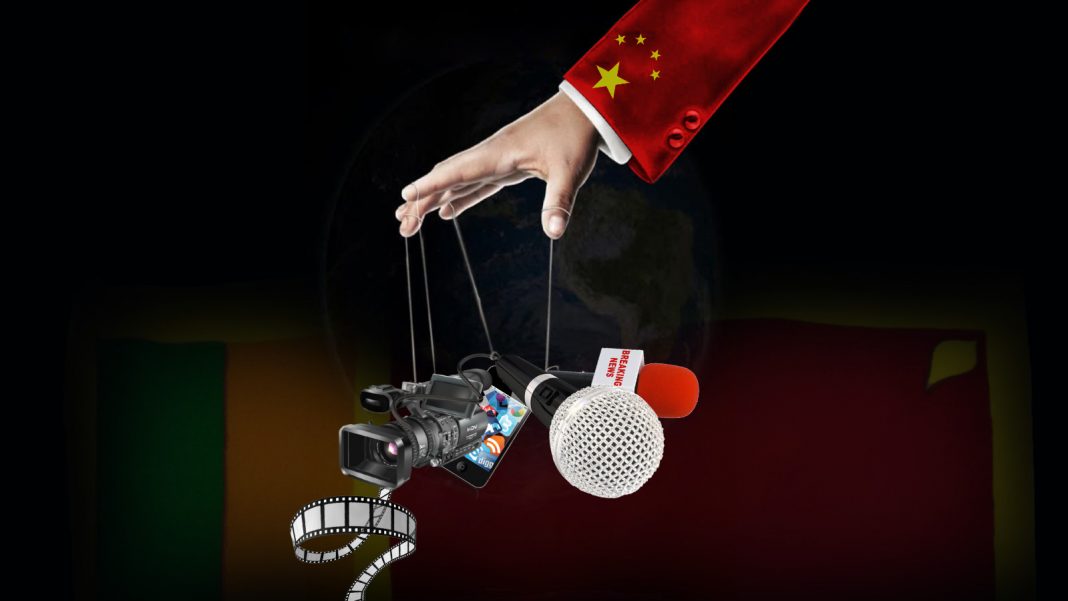In a report, titled ‘Beijing’s Global Media Influence” by Freedom House, it was studied that there was a notable media influence efforts in Sri Lanka. Sri Lankans most frequently consume news from television, radio, word of mouth, and newspapers, respectively, with television regularly consumed by 96 percent of the population in 2019.
Chinese state media content reaches audiences in Sri Lanka through a variety of channels, sometimes directly and other times filtered through local actors. Chinese state media is available in Sri Lanka on cable and satellite television. CGTN, the international arm of China’s state broadcaster, is available in English on Dialog TV (satellite), and the Chinese-language version China Central Television (CCTV) is available on Peo TV (cable). China Daily, an English-language daily owned by the CCP, is available in print, and Chinese state news agency Xinhua had a bureau in Colombo.
Key factors for content dissemination in SL:
Political leaders: Since the conclusion of its civil war in 2009, Sri Lanka has looked to China for both investment in reconstruction and political cover against international war crimes investigations. In recent years, the Chinese government has expended effort in wooing Sri Lankan political leaders at various forums, including by funding visits to China. Before being unseated in 2015, President Mahinda Rajapaksa visited China six times. In April 2020, TV Derana, one of the country’s most popular privately-owned television stations with close ties to the ruling regime, aired a questionable documentary in Sinhala about Xinjiang that framed widespread human rights abuses there as a positive example of countering terrorism. The Chinese embassy was accused of providing funding for the program.
China’s ‘Wolf-warrior’diplomats in social media: Chinese diplomats have adopted “wolf-warrior” tactics, regularly pushing back against criticism on social media platforms. Chinese diplomatic accounts in Sri Lanka have also benefited from amplification by fake accounts.
Chinese social media influencers targeting local audiences: Several Sinhala and English language Facebook accounts affiliated with Chinese state outlets like CRI and CGTN have been created in the past two years. To the casual viewer they would appear as personal pages rather than accounts affiliated with the Chinese party-state. An investigation by researcher Sanjana Hattotuwa revealed that many of the accounts were running Facebook ads targeting audiences in Sri Lanka, coinciding with their increased following in what he suspects to be a coordinated effort to expand local reach. Most of these accounts posted largely apolitical content, covering topics like similarities between Chinese and Sri Lankan culture (Buddhism, traditional medicines), food, and travel advice.
Partnerships with local pro-Beijing groups and publications: In 2016, Xinhua signed a content sharing agreement with the state-owned Associated Newspapers of Ceylon Limited. At least one of its papers, the English-language Daily News, regularly reprinted Xinhua content between 2019-2021.
Subsidized journalist trips: The Chinese government has arranged visits to China for journalists since at least 2010. In December 2018, the Sri Lanka-China Journalists Forum signed an agreement with Chongqing Normal University to establish journalist exchanges. In October 2019, the first batch of journalists from Sri Lanka under this agreement were invited to a month-long media training hosted by Chongqing Normal University, for a total of 18 participants.
Press Freedom ‘Censorship and intimidation’: Journalists and commentators in Sri Lanka critical of the Chinese government or its involvement in the country have reported multiple attempts by the Chinese embassy or other PRC-linked and pro-PRC actors to intimidate them into issuing apologies or removing content. On several occasions from 2019 to 2021, the Chinese embassy in Sri Lanka issued press releases or tweets from its official Twitter account that had strong or intimidating language. For instance, the embassy mocked comments made by researcher Sanjana Hattotuwa about social media shutdowns.
On April 27, 2021, the Colombo Gazette, an online paper which throughout the coverage period has published articles critical of China, including of the situation in Xinjiang, experienced a distributed denial-of-service (DDoS) attack that was traced to an IP address in China. The incident was reminiscent of a similar attack that occurred in March of 2020 that was also linked to a Chinese IP address.
What are things going to be like in future?
The relative success to date of their activity on global social media platforms, Chinese state outlets may continue or increase investment in the coming years to expand their influence in Sri Lanka. This may include:
- Targeting youth in local language
- Approaching the new government and exerting pressure on local media to cover China in ways that align with its interest.
- Financial troubles in the media industry may reflect to the increase in attractiveness of paid ads etc. that may increase Chinese state media influence.


















